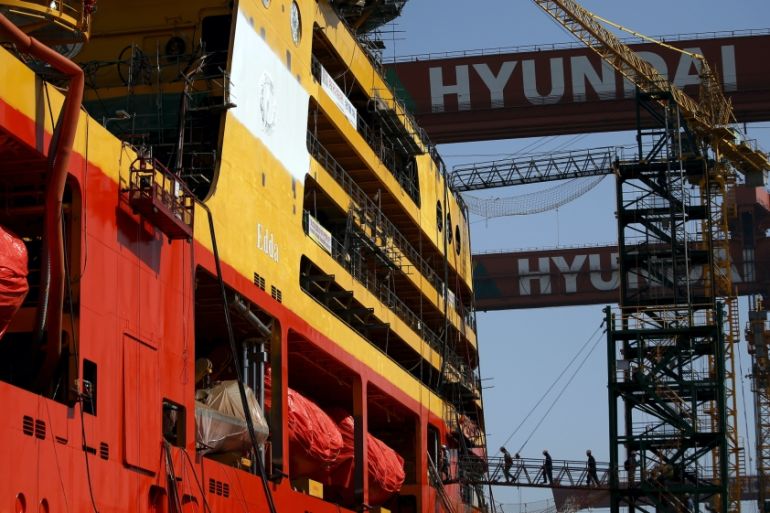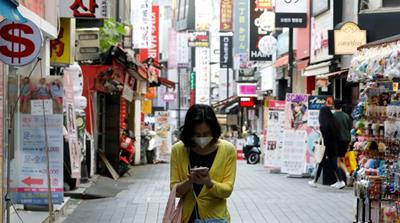South Korea enters recession as exports plunge by most since 1963
Economic output may have already bottomed out, but the recovery is unlikely to be swift, some analysts say.

The South Korean economy plunged into recession in the second quarter in its worst decline in more than 20 years as the coronavirus pandemic battered exports and social-distancing curbs paralysed factory output.
Asia’s fourth-largest economy shrank by a seasonally adjusted 3.3 percent in the June quarter from three months earlier, the Bank of Korea (BOK) said on Thursday. That is the sharpest contraction since the first quarter of 1998 during the depths of the Asian financial crisis, and steeper than a 2.3 percent contraction seen in a Reuters poll.
Keep reading
list of 4 itemsMexico’s teachers seek relief from pandemic-era spike in school robberies
‘A bad chapter’: Tracing the origins of Ecuador’s rise in gang violence
Why is the US economy so resilient?
Economists define a recession as two consecutive quarters of shrinkage in gross domestic product (GDP). South Korea’s GDP contracted by 1.3 percent in the first three months of 2020.
“While consumer spending should gradually recover, the threat from the virus is unlikely to fade entirely and some social distancing will probably have to remain in place,” Capital Economics Asia economist Alex Holmes said.
“Meanwhile, global demand is only likely to recover slowly, which will weigh on the export recovery.”
In year-on-year terms, GDP fell by 2.9 percent, the biggest fall since the fourth quarter of 1998 and also worse than a 2.0 percent decline seen in the poll.
Exports, which account for nearly 40 percent of the economy, were the biggest drag on growth, dropping by 16.6 percent compared to the previous three-month period to mark the worst reading since 1963.
Construction investment fell 1.3 percent quarter-on-quarter, while capital investment declined 2.9 percent.
Output from manufacturing and service sector fell by 9 percent, and 1.1 percent, respectively.
One saving grace has been a 1.4 percent gain in private consumption from three months earlier, thanks to government cash handouts that boosted spending on restaurants, clothes and leisure activities.
Third-quarter rebound?
Finance Minister Hong Nam-ki said the economy is likely to rebound from the third quarter.

“It’s possible for us to see China-style rebound in the third quarter as the pandemic slows and activity in overseas production, schools and hospitals resume,” Hong said at a policy meeting on Thursday.
It is a view shared by some economists.
“There is still scope for some improvement in the third quarter, and taking this into account, we should now see Korean GDP for the full year come in at around -1.6 percent in 2020,” Robert Carnell, Asia-Pacific head of research at Dutch bank ING, said in a report sent to Al Jazeera.
The government has rolled out about 277 trillion won ($231bn) worth of stimulus to fight the economic fallout from the pandemic so far. However, policymakers have little control over the global demand for the country’s exports, including items such as memory chips, cars and petrochemical products.
“The worst seems to be over. The base effect and [fiscal injection] from supplementary budget will improve investment,” said Park Sang-hyun, an analyst at HI Investment & Securities.
For the whole of 2020, analysts see the economy declining by a median 0.4 percent, which would be the first and largest contraction since 1998. But the International Monetary Fund estimates an even bigger 2.1 percent contraction.
Last week, the BOK’s governor said a downward revision from its previous projection of a 0.2 percent decline for 2020 was inevitable.